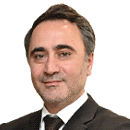Machines with highest performance and lowest energy consumption will be the future of textile finishing
HAS Group manufactures finishing machines for knitted, woven, denim, home textile, technical textile and carpets. Bahadir Kupeli, Chief Marketing Officer, HAS Group provides an overview on the latest technologies and innovations in the field of finishing.
What would you call the future of textile finishing machinery industry? Please explain.
With global enterprises, retailers, and brands increasing their activity to audit textile manufacturers, for workplace safety, green production and optimised business processes, developing machines that support production processes that are environmentally friendly will shape the future. Machines that provide new visual effects on fabrics (finishing) and automation, especially using software for process automation will be the future of textile finishing machinery industry.
What is the size of textile finishing machinery sector in Turkey? Who are the major players, and what clientele do they serve?
The size of the finishing machine market is over €105 million and HAS Group is the clear leader with around 15 per cent market share. The significant increase in our market share in Turkey is because we understand the needs of our customers and use their feedback for our research and development. Our headquarters is in Istanbul and our factories, including our R&D centre, are located in Corlu, approximately 100 km west of Istanbul. There are hundreds of dyeing houses around our factories and this customer proximity is a strategic advantage. Additionally, Turkish textile manufacturers need to have state-of-the-art production technology with most efficient output in order to be competitive, especially against Far East textile manufacturers. The proximity and the demands from our domestic customers help us offer innovative finishing technologies, which are also extremely appreciated in other countries. We export to nearly 60 countries worldwide, especially to developed countries like the US, Italy, England, Poland, Portugal, Belgium, France, Switzerland as well as strong textile manufacturing markets like Mexico, Uzbekistan, Bangladesh, Pakistan, Indonesia and of course India.
What are the latest innovations taking place in this industry?
The main focus is of course on ecological and sustainable production. The finishing machines especially for drying, fixation (fabric stabilisation), dyeing, etc, use valuable resources like gas, wood, coal or water, and consume high power in order to maximise the production output. Finishing machine manufacturers are answerable to their consumers. They need to follow a strategy to fulfil the customer demands for quality and highest output with the lowest energy consumption and minimal wastage of resources. HAS Group has invested in green technologies, for example since several years we use a heat recovery system, which we continuously improve to maximise energy savings. Currently, we are able to save up to 25 per cent energy for an 8 chamber stenter.
Additionally, HAS Group launched last year a new air filtration system, which ensures emission-free production, which we have combined with our heat recovery system. The result is green production and saving costs.
What after sales service do you provide to your clients? What is the near future plan in this direction?
We offer first level support locally as much as possible with our partners. Technicians from our partners are involved from the very early stage of a project: they participate in the on-site assembly of our machines. They get theoretical as well as practical training. The second level support is ensured through our HAS Group remote diagnostic and monitoring system. Since last year, we are delivering all our machines equipped with a Wi-Fi modem as a standard. We also provide a preventive maintenance service, which ensures maximum reliable runtime of our machines. But the most appreciated service is the fabric finishing process consulting through our application engineers. The further development in service will be very much influenced by Industry 4.0.
What is the growth percentage observed in your sales in the last two fiscals?
Our orders have grown by 20 per cent in the last two fiscals.
What are the developments towards automation and robotics?
I started my career at a famous German robotics company and worked there for over 10 years. Robotics will be a topic in every sector, where human beings are employed. Currently, most textile manufacturers do not recognise the potential of robotics and automation, but in the future, this mindset will change. I am aware of a few projects, for example a palletizing system for yarns which uses the robotics technology.
What clients do you serve? Is there any sourcing activity you carry out?
In the fabric finishing sector, we serve the knitting, woven, home textiles, carpet finishing, denim and technical textiles segments. We have begun to cater to the technical textiles market segment, where we have customers from the automotive, medical and functional textiles used for fire resistance and in sportswear. We also provide machines to manufacture fabrics for tea bags to a customer in Europe.
Please share details of the macro economic factors and other factors affecting them.
There are two major macro-economic parameters affecting our business. One is the demand for textiles. On an average, one person in a developed country consumes 21 kg textile per annum, while the consumption is 9 kg per annum in developing countries. Considering the fact that more and more people worldwide come into the middle-class bracket, the demand for textiles will increase. So, textiles is a growing business.
Second, macro parameter is the financial system. More than 90 per cent of our customers use financial loans to invest in machinery. Although there is no global financial crisis, but from time-to-time there are some local difficulties in banking system while exporting to a few countries.

